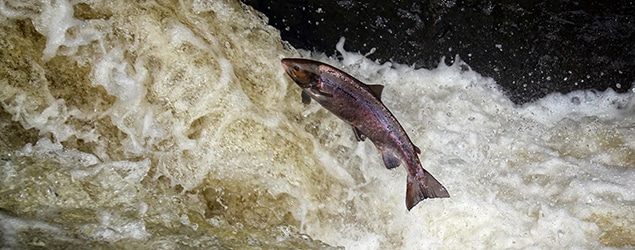Biotech Salmon Freed After 20 Years

AquAdvantage Salmon, the first genetically engineered fish intended for human consumption, were finally approved for sale this week by the FDA. These farm salmon have a tremendous advantage over conventional farm salmon — they mature in about half the time.
A typical farm salmon is “programmed” to only grow during the summer when resources are flush and not during the winter when resources are scarce. In a farm setting where food is abundant year-round, this is a disadvantage. The AquAdvantage Salmon was genetically engineered, by borrowing a couple of genes from other common fish, to grow year-round.
I say that the salmon were finally approved because AquaBounty, the company that invented the fast-growing fish, applied for permission to sell them from the FDA 20 years ago, in September, 1995.
Since they were invented, the fish were met with intense anti-biotech fear-mongering and were punted from administration to administration as they floundered for approval. Despite the fact that they have the same nutritional content, taste the same and are just as safe to eat as conventional farm salmon, they are slurred as a dangerous “Frankenfish.”
Even after the approval, anti-biotech activist groups are gearing up for a court battle, promising to do their worst to lock the fish back up or at least tie the technology up indefinitely in court. Andrew Kimbrell, executive director of Center for Food Safety, an anti-biotech activist group filing suit, called the fish a “dangerous contaminant,” and accused the FDA of neglecting to “protect the public” from them.
Still, AquaBounty should be celebrating. If they bought a bottle of wine for the occasion when they submitted the paperwork in 1995, by now it would be well-aged. But unlike a nice Bordeaux, life-enhancing technology isn’t one of those things that gets better by sitting on a shelf.
To put that in perspective, here is a list of other technological innovations that were released around the same time that AquaBounty applied for FDA approval (Henry Miller, former head of the FDA’s Office of Biotechnology mentions my list in his recent Forbes column):
- Nokia 9000 cell phone (weighed almost a pound and had a black and white screen)
- The 28.8k dial-up modem
- Amazon.com and eBay.com
- Internet Explorer
- The original Sony PlayStation
- The DVD
During the 20 years when these innovations have gotten smaller, faster, more powerful or even gone obsolete to be replaced by something better, the genetically improved salmon sat in regulatory limbo. If each one of these new technologies was met with a 20-year regulatory maze and activist fear-mongering, the way the AquAdvantage Salmon was, what are the chances that iPhones or Netflix or YouTube would have ever been invented?
In a forthcoming article titled “The Gene Revolution” for the Center for the Protection of Intellectual Property at George Mason University, I highlight 29 incredible biotech innovations that are making our lives better, safer and even more enjoyable. It’s shocking how many on the list took an incredibly long amount of time to reach the market — and tragically, how many, like Golden Rice, have never made it to dinner plates.
From the article:
It is not the case that every new biotech product will necessarily be a winner, but regulatory burdens, anti-GMO activists, and consumer fear have ensured that good products are unfairly shunned, will never see the grocery store shelf, or, worse yet, will never even be created.
Anti-biotechnology activists and our government agencies are successfully strangling what could and should be the next technological revolution.
Are we going to let them?



